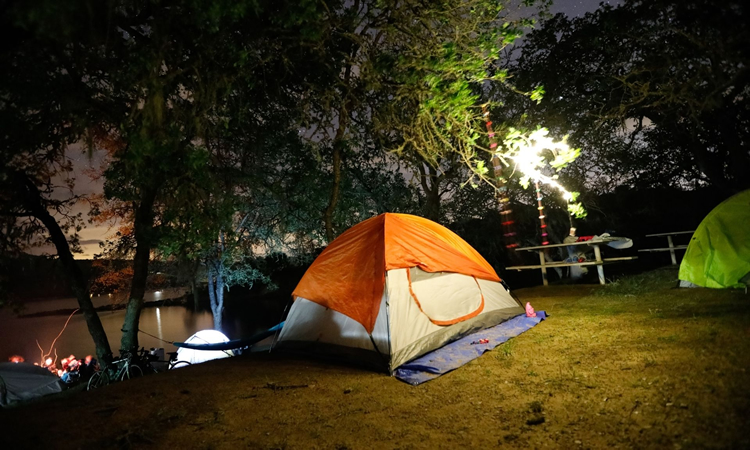Ticks love camping – who knew?
Campgrounds are a perfect storm for tick infestations. They didn’t get that outdoor adventurer gene from me, but my kids love to go camping. Especially my daughter, her husband, and their young daughter. So recently we took one for the team and joined them. My wife joined them in the tent. I slept in the car – and not well.

After an enjoyable outdoor fireside breakfast of sunny side up eggs, warmed over brioche buns, and instant coffee we ventured back to our respective homes. My entire family knows what it takes to be tick aware, so as soon as we got back home, my wife and I headed to the shower.
As she was washing her legs she noticed a teeny black spec on top on her right foot. After further inspection, it confirmed her worst fear. A tick was burrowing into her skin. Luckily, I was in the bathroom with her and immediately went to the drawer that had needle-nose tweezers in it. Trying to be as gentle as I could – and yet still capture that tiny beast – I successfully removed it and gave it a proper burial at sea. After being squished in nearby tissue paper, I flushed it down the toilet.
How To Remove A Tick

For a more clinical, pragmatic method, here is what The Centers for Disease Control Recommends on how to remove a tick:
If you find a tick attached to your skin, simply remove the tick as soon as possible. There are several tick removal devices on the market, but a plain set of fine-tipped tweezers works very well.
To Remove A Tick
- Use clean, fine-tipped tweezers to grasp the tick as close to the skin’s surface as possible.
- Pull upward with steady, even pressure. Don’t twist or jerk the tick; this can cause the mouth-parts to break off and remain in the skin. If this happens, remove the mouth-parts with tweezers. If you cannot remove the mouth easily with tweezers, leave it alone and let the skin heal.
- After removing the tick, thoroughly clean the bite area and your hands with rubbing alcohol or soap and water.
- Never crush a tick with your fingers. Dispose of a live tick by:
- Putting it in alcohol
- Placing it in a sealed bag/container
- Wrapping it tightly in tape or
- Flushing it down the toilet
Get Rid Of Ticks At Home with Ipswich Tick Control
 When camping, ticks dry up easily so they prefer shady, wet areas. While you might also prefer some shade over your tent, you’ll be able to avoid ticks better if you set up camp in a sunny area. They also like to hide in tall grass or piles of leaves, so pitching your tent in a cleared area will prevent ticks.
When camping, ticks dry up easily so they prefer shady, wet areas. While you might also prefer some shade over your tent, you’ll be able to avoid ticks better if you set up camp in a sunny area. They also like to hide in tall grass or piles of leaves, so pitching your tent in a cleared area will prevent ticks.
The same variables apply to your backyard, especially it the perimeter has tall grasses and wood piles where moisture lurks well after rainstorms and irrigation watering.
If you want dependable, proven tick control, contact your local tick control specialist. Be sure that your tick control service sprays your yard and surrounds your property with tick tubes. This tick double-trouble control and elimination method will ensure it’s one less thing you’ll have to worry about.

 Due to warmer winters in Massachusetts, ticks can and do quest even during the winter months. It is possible to be bitten by a tick in the fall and winter, and we should be concerned with ample protection during those months. Fortunately, reputable tick control professionals offer ‘out-of-season‘ methods of tick protection by way of
Due to warmer winters in Massachusetts, ticks can and do quest even during the winter months. It is possible to be bitten by a tick in the fall and winter, and we should be concerned with ample protection during those months. Fortunately, reputable tick control professionals offer ‘out-of-season‘ methods of tick protection by way of 